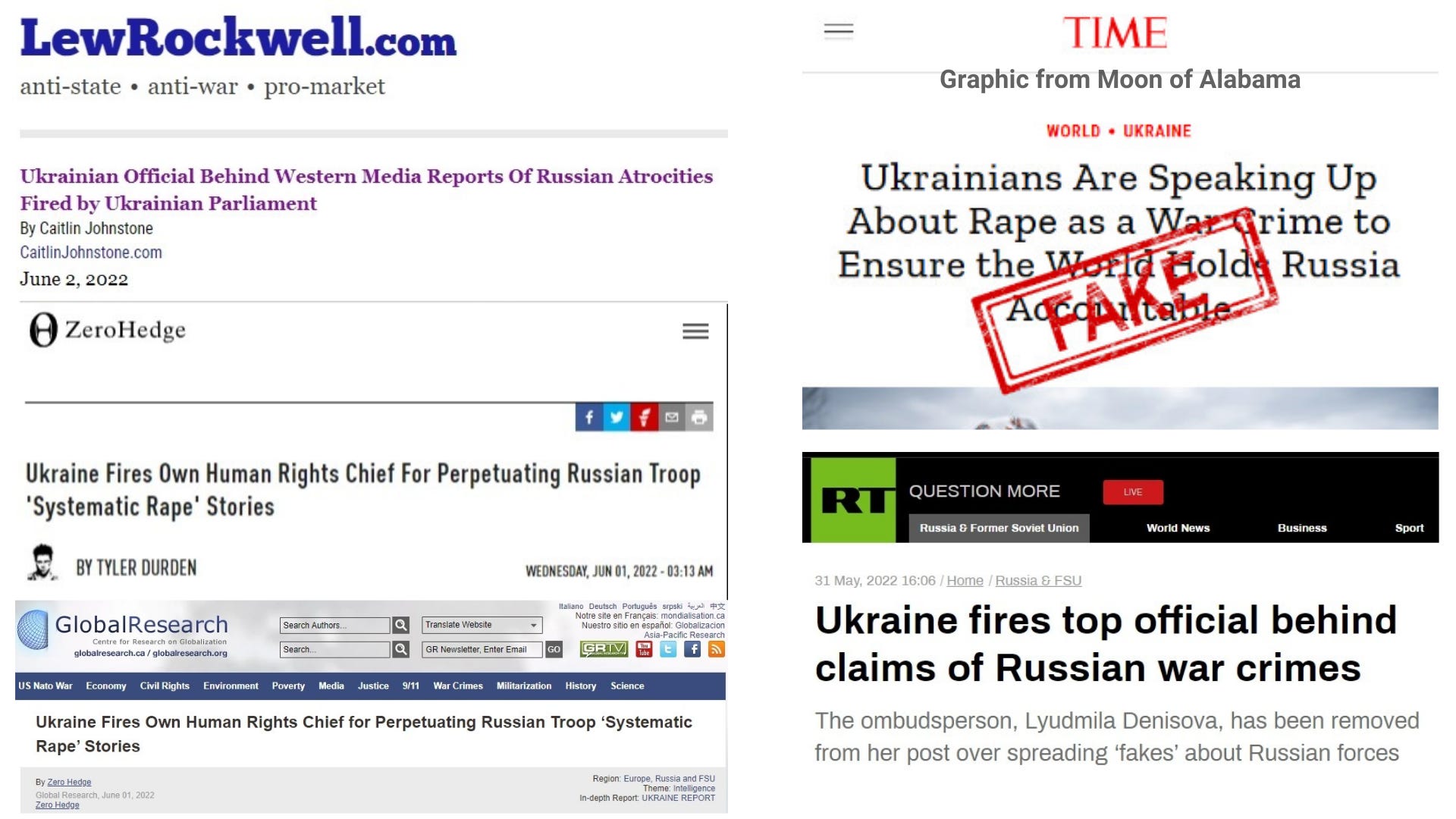
Pro-Kremlin outlets boost content that casts doubt on Ukrainian rape victims
Summary
- Pro-Kremlin media used the firing of an official to discredit Ukrainian rape victims, even though this official was not the only source of information. Two pieces of content that cited the same article were republished on many other websites. Russian intelligence controls at least one of the republishing websites.
- After articles from RT and Moon of Alabama came out on May 31, 2022, English-language websites started to publish content claiming Ukrainian reports of rape were not valid. Outlets backlinking to this story included those that Miburo, a malign influence research group, and the federal government have identified as part of the Russian propaganda and disinformation ecosystem. The Moon of Alabama article was linked to and mentioned significantly more often than the one from RT.
- The dismissive stories came out after the Ukrainian government let go of Lyudmila Denisova, a human rights official. Denisova “did not set up humanitarian corridors and the exchange of prisoners,” the Ukrainian government said. Instead, she focused on sharing stories about sexual assaults, for which she could not share evidence. This performance was unacceptable to the Ukrainian government.
- In sexual assault crimes, officials and law enforcement often cannot share more information without exposing the victim to further trauma. The Epstein trial is an example of this. Evidence of rape as a weapon in this war did not come from the dismissed official alone. The most compelling evidence is physical. Medical examiners found evidence of rape among victims of mass killings in Bucha.
- On June 6, at the 9056th meeting of the UN Security Council, representatives from Ghana, Brazil, Belgium, and Germany condemned the behavior of Russian soldiers in response to reports of them weaponizing rape against Ukrainian civilians.
Story timelines and network analysis

On May 31, RT.com and Moon of Alabama published stories. Both outlets portrayed the claims about war crimes, including the accusations of sexual assault of adults and children, as totally without merit. RT is a popular outlet under the control of the Russian state, but that article didn’t attract as much attention as the piece published on Moon of Alabama.
Moon of Alabama is a pro-Kremlin website that at least one extremist researcher has reported to Hoaxlines is popular with QAnon and other conspiracy groups. Before the 2022 invasion of Ukraine, the Moon of Alabama had been referenced or shared by pro-Kremlin, QAnon, and White Supremacist groups. Belarusian KGB, Russian-language channels, and hyperpartisan English-language channels cited Moon of Alabama.
Hoaxlines found at least 53 backlinks to the Moon of Alabama article within the first week, meaning that 53 other locations had likely backlinked or republished the Moon of Alabama article.
The Zero Hedge article was republished on influential websites like Global Research (1.3 million visits in the past three months) and InfoWars (8.5 million visits in the past three months) and was translated into many other languages.
- Zero Hedge was the first significant outlet besides RT to write about this story. It did so on June 1 and backlinked to the Moon of Alabama.
- The Zero Hedge piece was republished or cited by dozens of other websites like Global Research, Freedom of Thought, Sott.net, and Infowars on the same day, June 1.
- By June 2, six different Substack publishers had backlinked to the story: SÁT-CỘNG, a Skeptic, Strange Sounds, Eric Rosen, Lioness Of Judah Ministry, and Richard Duke.


